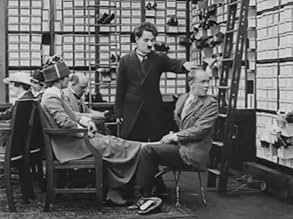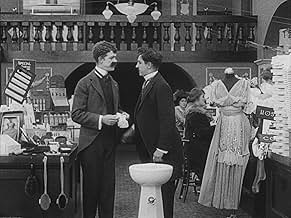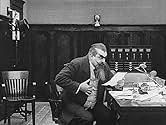IMDb RATING
6.6/10
2.8K
YOUR RATING
The Tramp is tricked into impersonating an embezzling floorwalker in a department store.The Tramp is tricked into impersonating an embezzling floorwalker in a department store.The Tramp is tricked into impersonating an embezzling floorwalker in a department store.
- Director
- Writers
- Stars
Henry Bergman
- Old Man
- (uncredited)
Frank J. Coleman
- Janitor
- (uncredited)
Fred Goodwins
- Shoe clerk
- (uncredited)
Bud Jamison
- Small Role
- (uncredited)
Tom Nelson
- Detective
- (uncredited)
Wesley Ruggles
- Policeman
- (uncredited)
- Director
- Writers
- All cast & crew
- Production, box office & more at IMDbPro
Featured reviews
Am a big fan of Charlie Chaplin, have been for over a decade now. Many films and shorts of his are very good to masterpiece, and like many others consider him a comedy genius and one of film's most important and influential directors.
From his post- Essanay period after leaving Keystone, 'The Floorwalker' is not one of his very best or even among the best of this particular period. It shows a noticeable step up in quality though from his Keystone period, where he was still evolving and in the infancy of his long career, from 1914, The Essanay period is something of Chaplin's adolescence period where his style had been found and starting to settle. Something that can be seen in the more than worthwhile 'The Floorwalker'.
'The Floorwalker' is not one of his all-time funniest or most memorable, other efforts also have more pathos and a balance of that and the comedy. The story is still a little flimsy, there are times where it struggles to sustain the short length, and could have had more variety and less more of the same repeition.
On the other hand, 'The Floorwalker' looks pretty good, not incredible but it was obvious that Chaplin was taking more time with his work (even when deadlines were still tight) and not churning out as many countless shorts in the same year of very variable success like he did with Keystone. Appreciate the importance of his Keystone period and there is some good stuff he did there, but the more mature and careful quality seen here and later on is obvious.
While not one of his funniest or original, 'The Floorwalker' is still very entertaining with some clever, entertaining and well-timed slapstick. It moves quickly and there is no dullness in sight.
Chaplin directs more than competently, if not quite cinematic genius standard yet. He also, as usual, gives an amusing and expressive performance and at clear ease with the physicality of the role. The supporting cast acquit themselves well.
Summing up, worth a look though Chaplin did better. 7/10 Bethany Cox
From his post- Essanay period after leaving Keystone, 'The Floorwalker' is not one of his very best or even among the best of this particular period. It shows a noticeable step up in quality though from his Keystone period, where he was still evolving and in the infancy of his long career, from 1914, The Essanay period is something of Chaplin's adolescence period where his style had been found and starting to settle. Something that can be seen in the more than worthwhile 'The Floorwalker'.
'The Floorwalker' is not one of his all-time funniest or most memorable, other efforts also have more pathos and a balance of that and the comedy. The story is still a little flimsy, there are times where it struggles to sustain the short length, and could have had more variety and less more of the same repeition.
On the other hand, 'The Floorwalker' looks pretty good, not incredible but it was obvious that Chaplin was taking more time with his work (even when deadlines were still tight) and not churning out as many countless shorts in the same year of very variable success like he did with Keystone. Appreciate the importance of his Keystone period and there is some good stuff he did there, but the more mature and careful quality seen here and later on is obvious.
While not one of his funniest or original, 'The Floorwalker' is still very entertaining with some clever, entertaining and well-timed slapstick. It moves quickly and there is no dullness in sight.
Chaplin directs more than competently, if not quite cinematic genius standard yet. He also, as usual, gives an amusing and expressive performance and at clear ease with the physicality of the role. The supporting cast acquit themselves well.
Summing up, worth a look though Chaplin did better. 7/10 Bethany Cox
Although Charlie Chaplin made some great short comedies in the late 1910's, others don't quite make it. Examples like His New Job and Shanghaied come to mind, and I would also The Floorwalker in this category.
Charlie gets mistaken for a manager of a department store (and vice versa). This manager tries to steal money from the cash register and make a run for it, and Charlie is just an honest costumer but getting blamed for some missing objects, stolen by other costumers.
There aren't many laughs in it, except for the last couple of minutes or so with some great scenes on the escalator. For the rest, quite disappointing.
4/10.
Charlie gets mistaken for a manager of a department store (and vice versa). This manager tries to steal money from the cash register and make a run for it, and Charlie is just an honest costumer but getting blamed for some missing objects, stolen by other costumers.
There aren't many laughs in it, except for the last couple of minutes or so with some great scenes on the escalator. For the rest, quite disappointing.
4/10.
This is the first picture Charlie Chaplin made at Mutual studios. After a year-long maturing period at Essanay, he had at last set off in search of greater creative freedom and vastly inflated salaries. This is precisely what Mutual gave him.
The most obvious difference between the Floorwalker and the shorts that went before it is the level of confidence and cinematic professionalism Chaplin now displays. There is a lengthy opening sequence before the little tramp even appears, establishing the antagonists and the scam in which Charlie will later become embroiled. Eric Campbell is introduced with a formidable close-up, giving him a more menacing and memorable entrance. There's also a bit of bold cross-cutting, some of which becomes a joke in itself. For example, we cut back-and-forth from Albert Austin tussling with the essentially harmless Charlie, while behind his back a gang of thieves rob the store blind. That particular gag also shows his willingness to sometimes move the camera away from himself, making his little tramp the cause of the comedy but not the focus of it. These were all techniques Chaplin had used before, but never quite to this extent or with this much bravura.
With a new studio came new supporting actors, and here we see the introduction of two very important figures in the Chaplin career. Most noticeable of these was the stupendous Eric Campbell, who fulfilled in the Mutual films the role of the bully. Campbell's appeal works on the old adage of "the bigger they come the harder they fall", but he's also a wonderfully expressive comedy character, all his movements looking comically exaggerated because of his size. The floorwalker also marks the debut of Albert Austin, who does a similar job to that of Billy Armstrong in the Essanays, that is, a lanky twerp for Charlie to wind up. He makes a good impression here, tumbling helplessly and striving to maintain his dignity. Fortunately, Chaplin brought across some of his best collaborators from the Essanay days, but Leo White and even Edna Purviance get a bit lost among all the new faces here. Honourable mentions go to Charlotte Mineau and Lloyd Bacon, both of whom had bit parts in a few Essanay pictures, now appearing in meatier roles.
In spite of its technical polish and auspicious debuts, it has to be said that the Floorwalker is one of the less entertaining Mutual pictures. It has its moments (surely the best of which is Charlie's "mirror-image" routine with Lloyd Bacon, repeated years later by the Marx brothers in Duck Soup), but there is bit too much going on and a few too many characters, with not enough high quality comedy in between. Chaplin would have to do a little better than this to justify his hefty new pay packet.
Still, let us not forget that all-important statistic – Number of kicks up the arse: 6 (3 for, 3 against)
The most obvious difference between the Floorwalker and the shorts that went before it is the level of confidence and cinematic professionalism Chaplin now displays. There is a lengthy opening sequence before the little tramp even appears, establishing the antagonists and the scam in which Charlie will later become embroiled. Eric Campbell is introduced with a formidable close-up, giving him a more menacing and memorable entrance. There's also a bit of bold cross-cutting, some of which becomes a joke in itself. For example, we cut back-and-forth from Albert Austin tussling with the essentially harmless Charlie, while behind his back a gang of thieves rob the store blind. That particular gag also shows his willingness to sometimes move the camera away from himself, making his little tramp the cause of the comedy but not the focus of it. These were all techniques Chaplin had used before, but never quite to this extent or with this much bravura.
With a new studio came new supporting actors, and here we see the introduction of two very important figures in the Chaplin career. Most noticeable of these was the stupendous Eric Campbell, who fulfilled in the Mutual films the role of the bully. Campbell's appeal works on the old adage of "the bigger they come the harder they fall", but he's also a wonderfully expressive comedy character, all his movements looking comically exaggerated because of his size. The floorwalker also marks the debut of Albert Austin, who does a similar job to that of Billy Armstrong in the Essanays, that is, a lanky twerp for Charlie to wind up. He makes a good impression here, tumbling helplessly and striving to maintain his dignity. Fortunately, Chaplin brought across some of his best collaborators from the Essanay days, but Leo White and even Edna Purviance get a bit lost among all the new faces here. Honourable mentions go to Charlotte Mineau and Lloyd Bacon, both of whom had bit parts in a few Essanay pictures, now appearing in meatier roles.
In spite of its technical polish and auspicious debuts, it has to be said that the Floorwalker is one of the less entertaining Mutual pictures. It has its moments (surely the best of which is Charlie's "mirror-image" routine with Lloyd Bacon, repeated years later by the Marx brothers in Duck Soup), but there is bit too much going on and a few too many characters, with not enough high quality comedy in between. Chaplin would have to do a little better than this to justify his hefty new pay packet.
Still, let us not forget that all-important statistic – Number of kicks up the arse: 6 (3 for, 3 against)
There are some good moments in "The Floorwalker" that make up for the more routine parts. Chaplin gets good mileage out of an identity mix-up - a theme he always liked - and he also has some good slapstick moments with Eric Campbell, one of his best supporting actors. The plot is mostly goofy, serving mainly as an excuse to allow the characters to chase each other around the store. Overall, it's about average for a Chaplin short feature, which makes it pretty good by most other standards.
If you have read my other reviews of Chaplin's comedy shorts, you may have noticed that I have generally given very poor reviews of films made during his first couple years in Hollywood (1914-1915). In general, they had no script or direction, were never really edited and just weren't particularly funny. In addition, Chaplin had a lot to learn about and develop regarding his Little Tramp character. by 1916, however, the movies began to improve as Chaplin was now the creative force behind all his films and he had honed his craft.
For a 1916 short, this is a pretty good film. It does have a pretty decent plot and it's pretty enjoyable. There's just one problem and I doubt if it is Chaplin's fault. When the film is nearing its conclusion, it just seems to end abruptly during the final climactic fight. I really think that the last few seconds of the film have been lost and that is why it ends this way. This isn't too uncommon for Chaplin shorts, as many have been pieced together from many different prints and many differing versions of the same short exist. I'd love to see a more complete print than was available on THE ESSENTIAL CHARLIE CHAPLIN COLLECTION, v. 7.
For a 1916 short, this is a pretty good film. It does have a pretty decent plot and it's pretty enjoyable. There's just one problem and I doubt if it is Chaplin's fault. When the film is nearing its conclusion, it just seems to end abruptly during the final climactic fight. I really think that the last few seconds of the film have been lost and that is why it ends this way. This isn't too uncommon for Chaplin shorts, as many have been pieced together from many different prints and many differing versions of the same short exist. I'd love to see a more complete print than was available on THE ESSENTIAL CHARLIE CHAPLIN COLLECTION, v. 7.
Did you know
- TriviaThis film was noted for the first "running staircase" (escalator) used in films.
- GoofsThe bag with the money goes up the escalator and remains upstairs. It is always seen in the background until the women enters the scene. Whenever she is in the shot, the moneybag disappears.
- Alternate versionsKino International distributes a set of videos containing all the 12 Mutual short films made by Chaplin in 1915 - 1917. They are presented by David Shepard, who copyrighted the versions in 1984, and has a music soundtrack composed and performed by Michael Mortilla who copyrighted his score in 1989. The running time of this film is 24 minutes.
- ConnectionsEdited into The Chaplin Cavalcade (1941)
Details
- Release date
- Country of origin
- Official sites
- Languages
- Also known as
- Shop
- Filming locations
- Production company
- See more company credits at IMDbPro
- Runtime
- 29m
- Color
- Sound mix
- Aspect ratio
- 1.33 : 1
Contribute to this page
Suggest an edit or add missing content



































